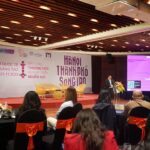Ngày 21/11, tại Bảo tàng Hà Nội, Sở Văn hóa và Thể thao Hà Nội phối hợp với Hội đồng Anh Việt Nam tổ chức Tọa đàm quốc tế “Thành phố sáng tạo Hà Nội – Xây dựng thương hiệu và phát triển nguồn lực”. Đây là một hoạt động nằm trong chuỗi các sự kiện tại Lễ hội Thiết kế sáng tạo Hà Nội năm 2023.
On November 21, at the Hanoi Museum, the Hanoi Department of Culture and Sports, in collaboration with the British Council Vietnam, organized the international seminar “Hanoi Creative City – Building Brand and Resource Development.” This event is part of the series of activities at the Hanoi Creative Design Festival 2023.
The seminar serves as an opportunity for Hanoi to exchange experiences with Creative Cities in the United Kingdom, such as Belfast, Derry~Londonderry, Dundee, and engage in discussions about collaborative opportunities, establishment, and future development of Hanoi as a Creative City, particularly in the field of design.
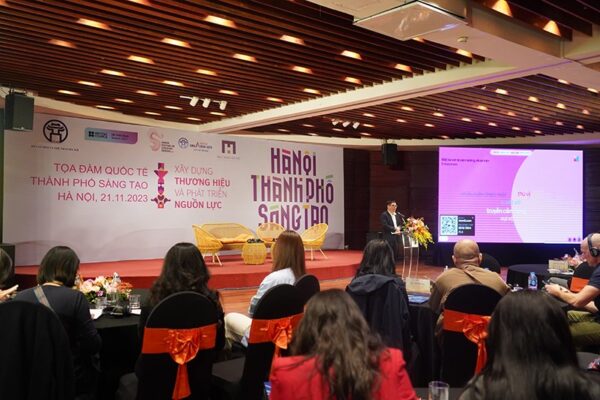
Overview of the seminar.
Results Achieved in Four Years of Promoting Creative Design
On October 30, 2019, Hanoi was honored as a member of the “UNESCO Creative Cities Network,” to leverage cultural resources and creativity as a foundation for sustainable urban development. This recognition established new cultural development objectives, sparked creative inspiration, and positioned a fresh international brand for Hanoi. It marked a significant step forward, providing favorable conditions for the capital to synergize economic, political, and social resources, especially maximizing cultural and human resources. Simultaneously, it demonstrated a commitment to transforming these resources into a cultural “soft power,” ensuring the robust promotion of inheriting and developing the millennium-old creative cultural flow of the capital.
Director of the Hanoi Department of Culture and Sports, Do Dinh Hong, shared insights into the city’s initiatives to boost creative design in cultural, economic, and social development programs over the past four years. Hanoi has achieved notable results, focusing on two main areas: the establishment of mechanisms, policies, and implementation plans, and the organization of specific activities to realize commitments and initiatives. Key among these are resolutions and plans issued by the city to promote the development of a Creative City, such as Resolution No. 09-NQ/TU dated February 22, 2022, from the Municipal Party Committee outlining the “Development of cultural industries in the capital during the 2021-2025 period, with a vision to 2030 and perspectives towards 2045”; Plans for the implementation of initiatives to participate in the UNESCO Creative Cities Network until 2025; Resolutions by the Hanoi People’s Council defining preferential treatment and support for “People’s Artists” and “Outstanding Artists”; Recognition of exemplary artists and clubs in the intangible cultural heritage field in Hanoi. From 2019 to 2023, Hanoi has collaborated with relevant stakeholders to organize numerous events to bring its commitments and initiatives to life. This includes creative design competitions contributing to urban reconstruction and sustainable development, the development of pedestrian-friendly spaces, cultural and craft innovation zones in the city, exhibitions and expos, cultural festivals, and the Hanoi Creative Design Festival. The city actively participates in conferences, seminars, and online forums, and connects with cities within the UNESCO Creative Cities Network.
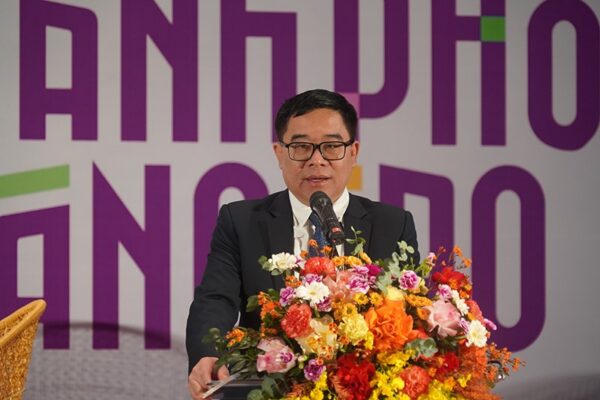
The director of the Hanoi Department of Culture and Sports, Do Dinh Hong, addressed the seminar.
“In the coming years, Hanoi will continue implementing various activities to connect and build the Creative City. This includes restructuring the coordinating and directing committees, participating in global and regional Creative City conferences and forums, enhancing communication efforts, and connecting, launching, and supporting activities within the city’s creative spaces network. Additionally, we plan to organize the annual Hanoi Creative Design Festival, host the Southeast Asian and Asia-Pacific Creative Cities Network Forum, and establish the Hanoi Creative Design Center and the Hanoi Cultural Industry Center,” added Mr. Do Dinh Hong.
International Experient on Building a Creative City Brand
At the seminar, experts from the United Kingdom shared valuable experiences in building the Creative City brand, emphasizing the use of culture as a foundation and placing people at the center of development. International cities, regardless of size, have successfully positioned their brands on the global stage by leveraging existing resources effectively.

Mr. Chris Mccreery, from the Cultural and Tourism Development Board of Belfast City Council
Mr. Chris Mccreery, from the Cultural and Tourism Development Board of Belfast City Council, a Creative City in the field of music in the United Kingdom, shared insights into Belfast’s three strategic pillars: culture, tourism, and music. The music strategy leverages UNESCO’s Creative City of Music brand to develop and nurture the local music industry, honoring the city’s musical stories and talents. The Belfast Music Board, consisting of 20 members representing musicians, founders, managers, educators, and practitioners, brings the UNESCO City of Music title closer to the community. The board focuses on diverse music genres, from classical, pop, rock, jazz, urban music, and international music to traditional and indigenous music. Numerous initiatives are underway to bring the UNESCO City of Music title closer to daily life. Additionally, Belfast implements various development programs, honoring culture and creativity, to raise awareness of the City of Music.
Discussing the topic of building the Creative City brand, Poppy Jarratt, Project Coordinator for the Creative City Design Project in Dundee, shared insights into Dundee, a small city with a population of around 150,000, built upon industrial heritage. Not only is Dundee a city rich in creative history, but it has also faced and continues to endure significant impacts from industrial decline, unemployment, and poverty. However, amid these challenges, Dundee recognizes the importance of investing in a high-quality cultural foundation, not just to attract tourists but also to ensure fundamental access to the arts for everyone in the community. For over 40 years, Dundee has committed to using culture and creativity as tools for transformation.

Ms. Poppy Jarratt, Project Coordinator for the Creative City Design Project in Dundee
Poppy Jarratt affirms, “We celebrate and outline the role of design as a tool for improving life by connecting the community with design, designers’ works, and design collaboration opportunities. We achieve this through connecting and collaborating with professional designers to create design-related opportunities in everyday life.” Dundee hosts the Dundee Design Month throughout May each year, featuring design-related activities and bringing together a diverse community of designers and residents. Alongside this, the brand “Dundee, UNESCO City of Design” is prominently displayed in the new home of the V&A Dundee Museum, Scotland’s design museum. The continuation of the Dundee Design Festival reinforces the city’s commitment to positioning and honoring design as a tool to drive community development, economic growth, and the city’s overall image.
Mobilizing Resources, Fostering Creative Communities
In addition to raising questions about reshaping the brand identity of cities, including Hanoi, the symposium also proposed ways to develop creative communities in urban areas. This is a key message that the international symposium aims to convey in its action-oriented objectives—efficiently connecting multi-generational and talented creators to formulate action plans that help the capital city define its values and distinctiveness within its brand.
Architect Doan Ky Thanh contends that creativity permeates every aspect of social life. However, the creative industry is confined to 13 occupational groups. When these groups have the opportunity to work and collaborate, they generate an explosion of surplus benefits. Therefore, the city needs to establish a sufficiently large ecosystem for creative activities. This includes allocating land for creative industry development and utilizing spaces, even temporarily abandoned ones. With active spaces, artists and creatives have more opportunities to collaborate, fostering creative development.
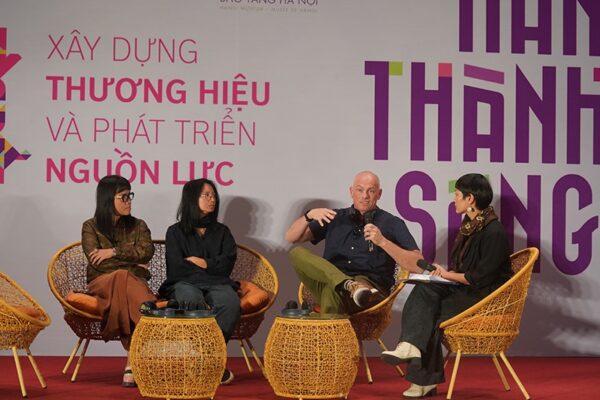
Mr. John Peto, representing the Cultural Creative City of Derry-Londonderry, spoke at the discussion.
John Peto believes in harnessing society’s creative potential and consolidating these innovations for development. To achieve this, he emphasizes the need to invest in creative skills, enhancing people’s understanding of these skills and encouraging skill-sharing to facilitate collaborative creativity. According to him, the role of local government and management agencies is crucial in this process.
Representatives from Creative Cities in the UK and Hanoi’s creative community also addressed the issue of creating spaces for innovative activities. Even in cities like those in the UK or Hanoi, there is a shortage of such spaces. In the short term, creatives can repurpose old shops or unused spaces into creative hubs. However, in the long run, there is a need for land, sufficiently large spaces, potentially repurposing old industrial plants, or constructing new ones.
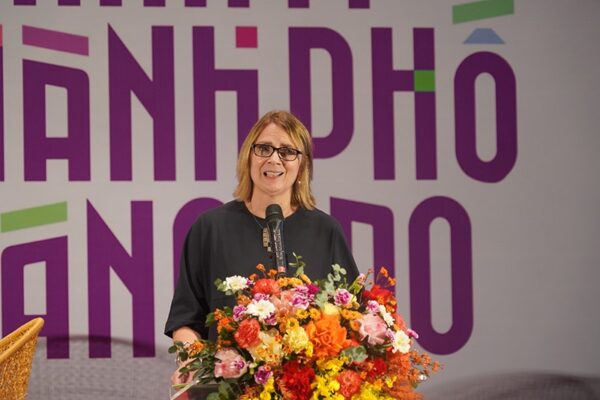
Ms. Donna Mcgowan, Director of the British Council in Vietnam.
Emphasizing the significant role and value of the creative economy, Donna Mcgowan, Director of the British Council in Vietnam, asserted that the creative industry is not merely a choice but an integral part of development in the new century. It binds societies together and addresses numerous contemporary challenges. The success of the creative economy stands out as one of the bright spots for the United Kingdom. Hence, the British Council consistently supports the creative industry with fresh perspectives, future-oriented initiatives, and a commitment to innovation. Donna Mcgowan affirmed her dedication to fostering collaboration, and sharing ideas with Hanoi to support the recognition of the Creative City and the development of the cultural industry. She expressed hope that both parties would achieve their goals and missions, propelling Hanoi to fulfill its aspiration as a Creative City in the realm of design at a new height.
Thao Nguyen

